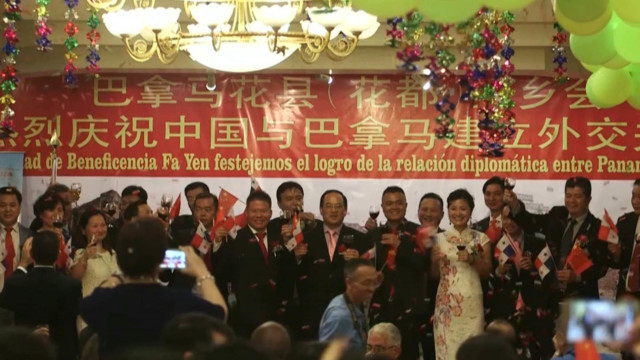Panama’s Chinese community is celebrating Monday’s announcement of establishment of diplomatic relations between the two countries.
It comes as Panama’s Foreign Minister, Isabel de Saint Malo, returned to the Central American nation, following a visit to Beijing earlier this week. There, she met with her Chinese counterpart Wang Yi, and the two signed the agreement.
CGTN’s Roee Ruttenberg reports.
In Panama City this week, members of the Fa Yen community – the largest of its kind in Panama, representing Panamanian descendants from the Chinese province of Guangdong, gathered for a type of celebration usually reserved for big holidays, like the Chinese New Year. But this is June. People like lawyer Luisa Lam Siu said they were very happy that the government announced it had severed diplomatic ties with Taipei in exchange for Beijing.
“I was expecting diplomatic relations a long long time ago,” Lam Siu said at the start of the celebration held at a popular Chinese restaurant. “I’m Chinese, but I was born here in Panama. I feel like I’m part of China and the Panamanians have to know about this.”
Cheung Ngan Wu, a marketing consultant a popular local Chinese commentator, said the community was surprised, but not very much.
“When President Varela recalled our ambassador from Taiwan almost two months ago, and the Taiwanese recalled their envoy from Panama, and they weren’t replaced, we became a bit suspicious,” Ngan Wu said.
For some, the announcement was very personal. Biomedical engineer Juan Pablo You’s great-grandfather came from China a century ago to help build the Panama Canal. “He never left,” You said. “It’s a very profound feeling for me and my family, knowing that Panama has had a relationship with China for more than 160 years, and that now that relationship is becoming more official and stable.”
An estimated 300,000 Chinese Mainlanders and their descendants now live in Panama. They represent a significant chunk of the population in a country of just four million people. Indeed, the Chinese community here has permeated nearly every part of Panamanian society. Some fund big projects, while others run small shops that are known locally as “el Chino,” or “the Chinese.”
Carlos Siu’s family sells imported Asian products at Casa Juan Siu, named after his grandfather. The shop, in one of Panama City’s two Chinatowns, has shelves that include items imported from Taiwan. “We have a free trade agreement with Taiwan, “ Siu says. “We don’t know if it’s going to be affected in anyway, or, commercially, what’s going to happen.”
Nearby, in one of the capital city’s high-rises, Taiwan’s mission now sits closed. Its flag no longer flies outside. It’s also been removed from a Taiwanese-supported school , one of the capital’s biggest and best. School officials declined our request for an interview, but we are told they are disappointed.
But for the most part, most here say: this is a time for celebration. A time for looking ahead, not back.
 CGTN America
CGTN America

